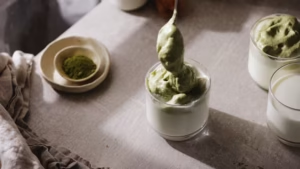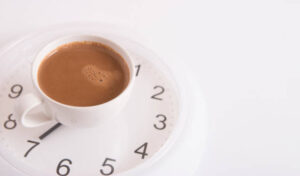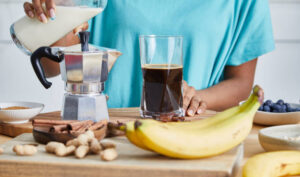Tea or coffee? It’s a classic debate, especially among those who rely on caffeine for their daily boost. But when it comes to caffeine content, how does black tea really compare to coffee? Whether you’re looking to switch up your morning routine or simply curious about your favorite beverages, this question deserves a deeper look. This blog will explore the intricacies of caffeine content in black tea and coffee, and what it means for you.
Understanding Caffeine
Caffeine is the world’s most widely consumed psychoactive substance. Found naturally in over 60 plant species, including coffee beans and tea leaves, it’s known for its ability to increase alertness and reduce fatigue. But how does caffeine actually work in our bodies, and why do we crave it so much?
When you consume caffeine, it blocks adenosine—a neurotransmitter that makes you feel tired—allowing other neurotransmitters like dopamine to flow more freely. This chemical reaction boosts brain activity, leading to increased focus and energy. However, the effect of caffeine can vary greatly from person to person, depending on various factors such as age, weight, and overall health.
While caffeine is generally safe in moderate amounts, it’s important to be aware of its potential side effects. Consuming too much can lead to symptoms like jitteriness, increased heart rate, and even insomnia. Therefore, understanding the caffeine content in your favorite drinks is crucial for maintaining balance.
What Is Black Tea?
Black tea is one of the most popular types of tea worldwide, known for its bold flavor and rich color. Unlike other teas, black tea is fully oxidized, giving it a robust taste. It’s often enjoyed with milk, sugar, or lemon, and is a staple in many cultures.
Originating from the leaves of the Camellia sinensis plant, black tea undergoes a lengthy withering, rolling, and drying process. This oxidation not only affects its flavor but also its caffeine content. Interestingly, the longer the oxidation process, the richer the flavor and higher the caffeine level.
Black tea is not just a morning pick-me-up; it also offers various health benefits. Rich in antioxidants, it can help reduce inflammation and improve heart health. Some studies even suggest that regular black tea consumption may lower the risk of chronic diseases.
The Popularity of Coffee
Coffee has been a beloved beverage for centuries, fueling everything from morning routines to weekend brunches. Its deep, complex flavors and aromatic appeal make it a versatile drink that can be enjoyed in countless ways—from a simple espresso to an elaborate latte.
The coffee plant, primarily grown in tropical regions, produces beans that need to be roasted and brewed to create the beverage we know and love. The type of roast, grind, and brewing method all play a role in determining the final caffeine content of your cup.
Besides its rich taste, coffee is renowned for its stimulating effects. Many people rely on its caffeine kick to wake up or power through an afternoon lull. But like all good things, moderation is key. Too much coffee can lead to restlessness and even dependency over time.
Caffeine Content in Black Tea
The caffeine content in black tea varies depending on several factors, including the type of tea leaves, brewing time, and quantity used. On average, an 8-ounce cup of black tea contains about 40-70 milligrams of caffeine.
Brewing time has a significant impact on caffeine levels. The longer you steep your tea, the more caffeine it will contain. Similarly, using a larger amount of tea leaves will increase the caffeine concentration. Thus, understanding your preferred strength and adjusting your brewing method accordingly can help tailor your caffeine intake.
It’s worth noting that while black tea contains less caffeine than coffee, it still provides enough to give you a gentle energy lift. This makes it a suitable option for those looking to reduce their caffeine consumption while still enjoying the benefits of a caffeinated beverage.
Caffeine Content in Coffee
Coffee is a caffeine powerhouse compared to black tea. An average 8-ounce cup of coffee contains around 95 milligrams of caffeine, though this can vary significantly depending on factors like bean type, roast level, and brewing method.
Espresso, for instance, packs a more concentrated caffeine punch, with about 63 milligrams per shot (roughly an ounce). In contrast, a standard drip coffee may contain slightly less caffeine per ounce but more overall due to its larger serving size.
Factors such as the grind size and water temperature also affect caffeine content. Finer grinds and higher temperatures extract more caffeine, leading to a stronger cup. Understanding these dynamics can help coffee lovers customize their caffeine fix to suit their personal preferences.
Comparing Black Tea and Coffee
When comparing the caffeine content of black tea and coffee, it’s clear that coffee typically contains more caffeine. However, the difference isn’t as stark as one might assume. While coffee usually offers a bigger caffeine boost, black tea provides a milder, more prolonged release of energy.
This distinction makes black tea a popular choice for those seeking a gentler pick-me-up without the jitters often associated with coffee. Additionally, black tea’s lower caffeine content means you can enjoy multiple cups throughout the day without exceeding recommended limits.
That said, individual preferences and tolerances play a significant role in choosing between black tea and coffee. Some people may prefer the stronger kick of coffee, while others might appreciate the subtler lift and nuanced flavors of black tea.
Health Implications of Caffeine Consumption
Moderate caffeine consumption is generally considered safe for most adults, providing various benefits like improved focus and enhanced physical performance. However, excessive intake can lead to negative effects such as anxiety, insomnia, and digestive issues.
For those with caffeine sensitivities or specific health conditions, it’s essential to monitor intake and choose beverages accordingly. Black tea offers a lower-caffeine alternative to coffee, making it an attractive option for individuals who need to limit their consumption.
Ultimately, understanding the caffeine content in your favorite drinks and how they affect your body is key to maintaining a balanced, healthy lifestyle. By doing so, you can enjoy the best of both worlds—flavorful beverages and optimal well-being.
Tips for Reducing Caffeine Intake
If you’re looking to reduce your caffeine intake without sacrificing your favorite beverages, consider these tips:
- Opt for decaffeinated versions of tea and coffee. They offer the same great taste with significantly less caffeine.
- Experiment with alternative brews like herbal teas, which are naturally caffeine-free and come in various flavors.
- Gradually decrease your serving size or brewing time to lower caffeine content without losing flavor.
Remember, moderation is key. By being mindful of your consumption and exploring new options, you can enjoy a balanced approach to caffeine without compromising on taste or enjoyment.
Exploring Decaffeinated Options
Decaffeinated tea and coffee provide a solution for those who want to enjoy their favorite drinks without the stimulating effects of caffeine. These beverages maintain most of their original flavors while offering a gentler experience.
The decaffeination process removes the majority of caffeine from the leaves or beans, making them suitable for individuals with sensitivity to caffeine or those looking to reduce their overall intake. While some flavor nuances may be lost during this process, advancements in technology have made it possible to preserve much of the original taste.
If you’re curious about trying decaffeinated options, many brands offer a wide range of choices in both tea and coffee varieties. With a bit of exploration, you’ll likely find a decaf version that satisfies your palate.
The Role of Herbal Teas
Herbal teas, unlike traditional black tea or coffee, are made from various plant materials other than tea leaves. These caffeine-free alternatives come in countless flavors and offer unique health benefits depending on their ingredients.
Popular herbal teas include chamomile, peppermint, and rooibos, each offering its own distinctive taste and potential wellness properties. Chamomile is known for its calming effects, peppermint can aid digestion, and rooibos provides antioxidants similar to those found in traditional tea.
By incorporating herbal teas into your routine, you can enjoy a diverse range of flavors and experiences without worrying about caffeine content. This makes them an excellent option for unwinding after a long day or as a comforting beverage before bedtime.
FAQs about Black Tea and Coffee
- Does black tea have more caffeine than coffee?
- Generally, no. A typical cup of coffee contains more caffeine than a cup of black tea. However, the exact amount can vary based on factors like brewing time and quantity used.
- Can I drink black tea if I’m sensitive to caffeine?
- Yes, but with caution. While black tea has less caffeine than coffee, it still contains some. Consider opting for decaffeinated or herbal teas as alternatives.
- Which is healthier, black tea or coffee?
- Both black tea and coffee offer health benefits when consumed in moderation. Black tea is rich in antioxidants, while coffee can enhance mental alertness. Choose based on your personal preferences and dietary needs.
- How can I reduce the caffeine content in my tea or coffee?
- To lower caffeine content, use fewer leaves or beans, steep for a shorter time, or choose decaffeinated versions. Experiment with these methods to find what works best for you.
In conclusion, understanding the caffeine content in black tea and coffee is essential for making informed choices about your daily beverages. By exploring different options and finding what suits your needs, you can enjoy the benefits of these drinks while maintaining a balanced lifestyle.






